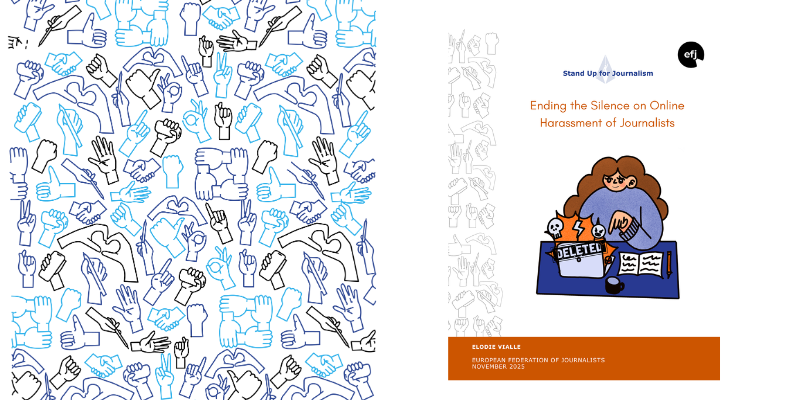
On the occasion of the International Day for the Elimination of Violence against Women, the European Federation of Journalists (EFJ) is releasing a new report “Ending the Silence on Online Harassment of Journalists”.
Authored by journalist and tech policy advisor Elodie Vialle, the report provides an overview of the widespread phenomenon that is online harassment targeting journalists, whose normalisation makes it harder to address. It documents trends, identifies key challenges, highlights good practices, and offers actionable recommendations for all actors – journalists’ unions and associations, newsrooms, social partners, policy makers, as well as online platforms – to take action to better protect journalists online.
According to a survey among EFJ members from across Europe, 87% of respondents reported that women in their organisations had been targeted; and 17% mentioned attacks against gender minorities. Racist attacks were reported by half of the EFJ survey respondents. The forms of abuse range from hate speech (82%) and insults (78%), to rape threats (40%) and other forms of gender-based violence (65%).
New tactics such as spoofing, impersonation, and other malicious AI-generated content used against journalists’ are spreading rapidly and further impact journalists’ ability to do their work. The author also points out that online violence too often leads to other forms of violence and pressure offline, underscoring the need for immediate response to prevent escalation.
This report is the first of its kind to include a detailed guide for journalists’ organisations to better protect journalists online. It lays out the legislative instruments, such as the European Media Freedom Act (EMFA) and Digital Services Act (DSA), and explains how they can be leveraged to call out for better protections for journalists against online harms“The EFJ study shows how widespread and dangerous this threat is, so read the statements of colleagues who face these attacks every single day. This doesn’t happen in a virtual world where, once you shut your laptop, it all simply vanishes. Behind every threat is a real person whose life, safety, and dignity have been harmed. We must stand together to support and protect journalists from the personal and professional consequences of online harassment.” EFJ President Maja Sever.
“Online harassment is not only an attack on individual journalists, but a deliberate strategy to silence public debate. Women journalists and those from minority backgrounds are disproportionately targeted, facing systematic campaigns of gendered and racist abuse that push colleagues to self-censor, withdraw from social media or even leave journalism altogether. Protecting those most at risk means defending press freedom and ensuring that all voices can be heard without fear,” added Elena Tarifa, Chair of the EFJ Gender and Diversity Expert Group (GENDEG).
While safety mechanisms exist in most of the European countries, they remain poorly implemented by governments, public authorities, platforms and media outlets. The report calls for a collective response to address a phenomenon that is not a personal issue, but a systemic professional risk.



